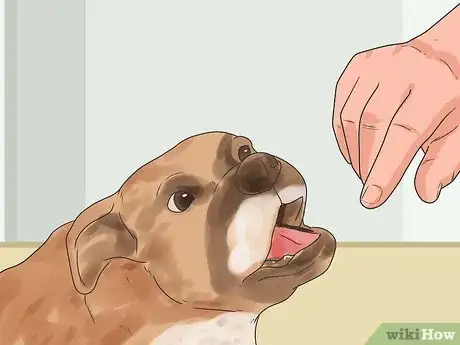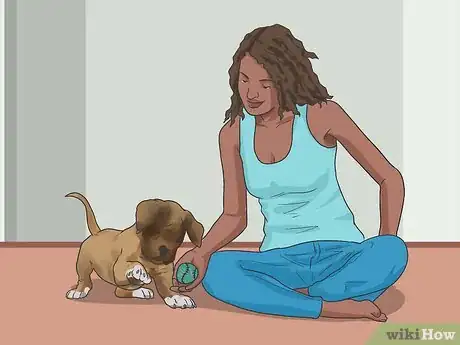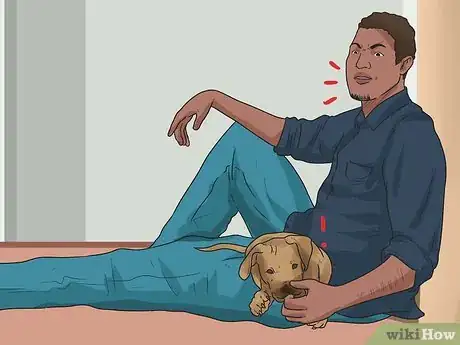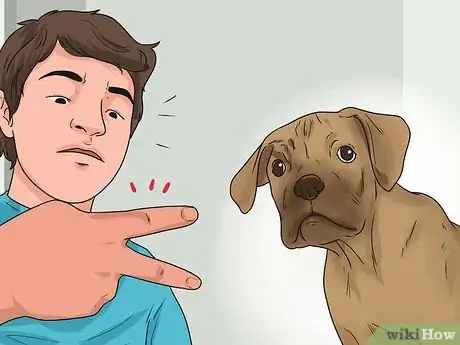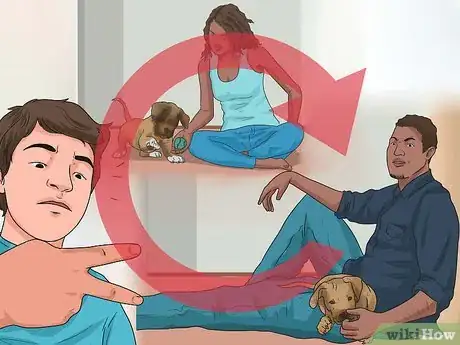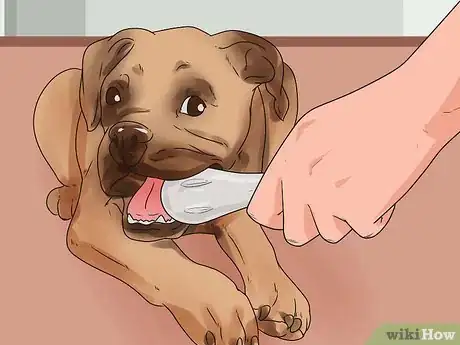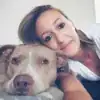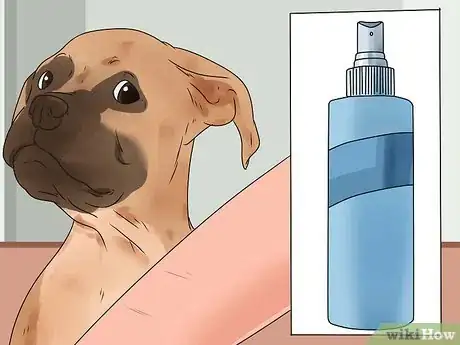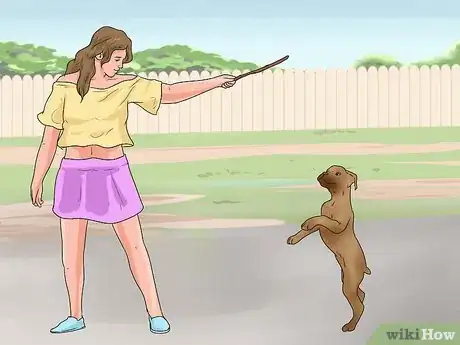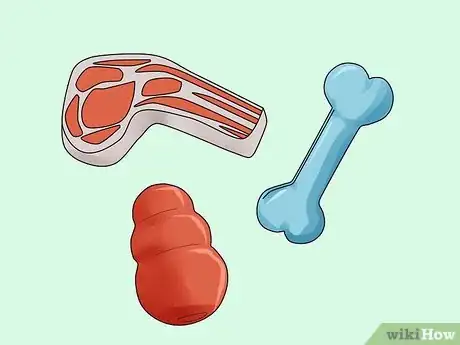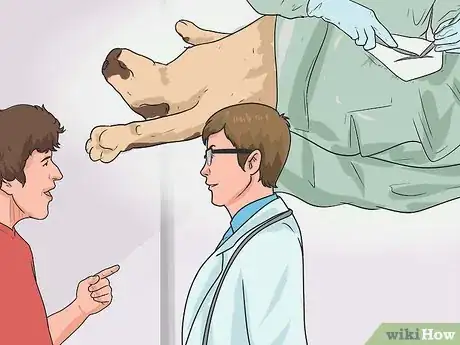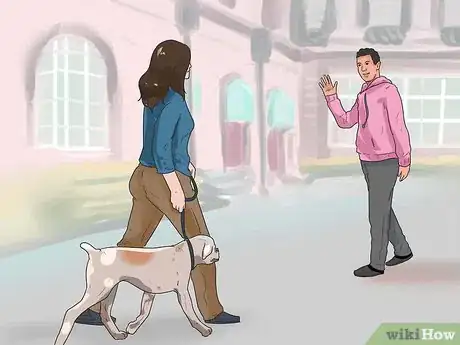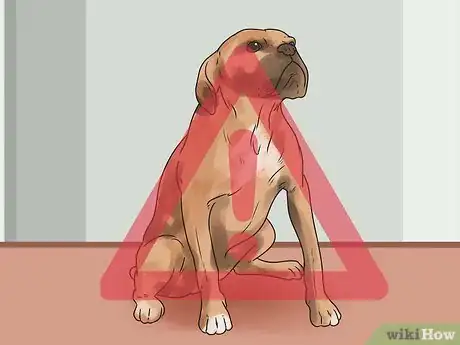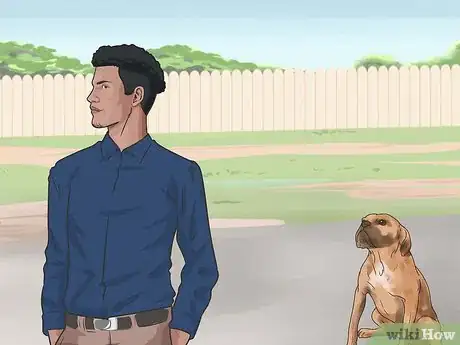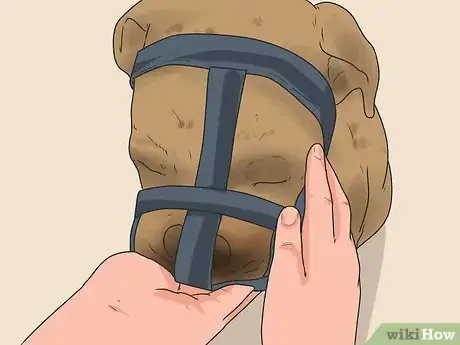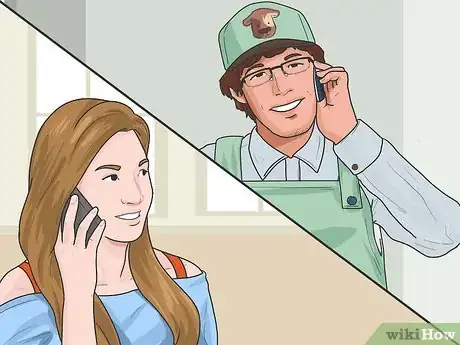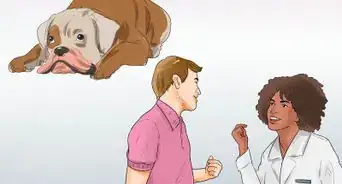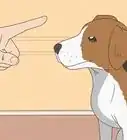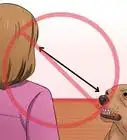This article was co-authored by Jessica Powell. Jessica is a Certified Professional Dog Trainer and the Owner of Proud Paws Dog Training, a small business offering private coaching and in-home dog training services to dog parents across the San Fernando Valley of Los Angeles, California. With nearly ten years of experience, she has extensive knowledge and experience in dog behavior, effective communication techniques, animal welfare, manners training, behavioral modification, and enrichment. Jessica holds a Bachelor of Science degree in Animal Management and is also an experienced shelter professional.
There are 13 references cited in this article, which can be found at the bottom of the page.
This article has been viewed 135,700 times.
Boxers, like many dogs, are highly energetic. They need a lot of attention and therefore, can be prone to playful biting, especially as puppies. Teaching your dog not to bite is easiest when he is young, but you can also work on boxers when they are adults.
Steps
Training Your Puppy to Not Bite Hard
-
1Teach your dog the strength of his bite. Bite inhibition is what a dog learns about how strong his bite is. Basically, when playing with other dogs, your dog can learn to not bite hard enough to harm another dog. Your dog can learn to do the same with humans, as humans can take even less force than other dogs.[1]
- It's important to teach the pup to not bite hard first, so that if your pup ever does decide to bite out of the blue, it's less likely to break skin or cause a serious injury.[2]
-
2Play with your puppy. The first step in this training is to start playing with your pup. Let him mouth on your hand, though not hard.[3]Advertisement
-
3React when your puppy bites hard. When your puppy actually chomps down on your skin, you need to react. Make a noise like a yelp, or yell "Ow!" Your pup should jump back at your reaction. If your reaction doesn't work, try a different sound.[4]
-
4
-
5Keep repeating the process. Wait a bit to start play again. Once you begin again, repeat the process if your pup bites hard again. Repeat as many times as your pup needs to get the picture.[7]
-
6Praise him only for not biting. Never praise your dog for biting, even if the bite is gentle and playful. Make sure he knows that it is not okay to bite and praise him for not biting.
Teaching a Boxer Puppy Not to Bite at All
-
1Trade skin for chew toys. When your dog starts biting, give him a chew toy instead.[8] That teaches your dog that his teeth belong on the toy, not you.[9]
- While you want to train your pup not to bite hard, you do eventually want to teach him not to bite at at all, which is where these steps can help.
-
2Try skin-safe deterrent. Most pet stores sell deterrents that your dog will not like the taste of, such as bitter apple. When you're playing, try putting the deterrent on your skin. Once the dog tastes it a few times, he'll likely want to stay away from human skin.[10]
-
3Keep him distracted. Boxers are high-energy dogs that need a great deal of play. Try very active games such as fetch. These games will help your dog release energy, and at the same time, move him away from biting games.[11]
-
4Keep him engaged. Boxers need to have lots of entertainment. Provide enough toys so that he doesn't get bored; when he's bored, he may lash out or bite. Try rotating them out so that when he gets bored with the first couple, you'll have more on hand to pique his interest.[12]
Teaching an Adult Boxer Dog Not to Bite
-
1Begin by getting your boxer spayed or neutered. This step may not seem intuitive to most new boxer owners. However, this step generally makes dogs less aggressive, so it should be your first step when trying to teach your dog not to bite.[13]
-
2Let your boxer socialize with dogs and people. Boxers are highly social animals, and they enjoy being around other dogs, especially boxers.[14] Dogs teach other dogs how much biting is appropriate; when a dog stops playing and bites too hard, that dog is ostracized for a bit.[15]
- In addition, try letting your dog get to know other people. The more people your dog knows, the calmer he'll be when he meets new people.[16]
- Therefore, try taking your dog out to socialize. A dog park is a good place to provide socialization.
-
3Keep stress under control.[17] Boxers usually bite when they are stressed or frightened. If you know a particular situation is going to stress your boxer out, don't take him. For instance, if he's not used to social situations, don't take him to a big crowd on his first outing. Work up to crowds gradually. Though your dog may be able to work up to these situations when properly trained, when he's first starting out, try to keep his stress down.[18]
-
4Give time-outs for biting. When your dog bites, yelp and walk away. Go to another room if possible. Stay away for at least a minute. That teaches the dog that this type of behavior results in the end of your attention.[19]
-
5Know when to back off. If your dog is too aggressive and has a history of biting, use a muzzle to keep people safe and to seek professional help at the earliest possible time.[20] Some signs that the dog is behaving aggressively and more likely to bite are:
- Protecting toys or food
- Weight forward, head lowered, raised lips, ears back, direct stare
-
6Try professional help. Contact a dog trainer or animal behaviorist in your area.[21] These professionals can help you get your dog under control. They may be able to see the key to why your dog is biting when you can't because they know more about dog behavior than you do; they can read a dog's body language without anthropomorphizing it, meaning they won't interpret dog behavior through the lens of human body language.[22]
Expert Q&A
-
QuestionAre boxers aggressive? When do they stop growing?
 Melissa Nelson, DVM, PhDDr. Nelson is a Veterinarian who specializes in Companion and Large Animal Medicine in Minnesota, where she has over 18 years of experience as a veterinarian in a rural clinic. She received her Doctor of Veterinary Medicine from the University of Minnesota in 1998.
Melissa Nelson, DVM, PhDDr. Nelson is a Veterinarian who specializes in Companion and Large Animal Medicine in Minnesota, where she has over 18 years of experience as a veterinarian in a rural clinic. She received her Doctor of Veterinary Medicine from the University of Minnesota in 1998.
Veterinarian Boxers are no more aggressive than any other breed of dog, and they stop growing at about 9-12 months of age.
Boxers are no more aggressive than any other breed of dog, and they stop growing at about 9-12 months of age. -
QuestionHow do you make your dog stop biting you?
 Melissa Nelson, DVM, PhDDr. Nelson is a Veterinarian who specializes in Companion and Large Animal Medicine in Minnesota, where she has over 18 years of experience as a veterinarian in a rural clinic. She received her Doctor of Veterinary Medicine from the University of Minnesota in 1998.
Melissa Nelson, DVM, PhDDr. Nelson is a Veterinarian who specializes in Companion and Large Animal Medicine in Minnesota, where she has over 18 years of experience as a veterinarian in a rural clinic. She received her Doctor of Veterinary Medicine from the University of Minnesota in 1998.
Veterinarian Giving the dog something else to chew (a toy) and telling him/her "NO BITE" will work if you respond consistently.
Giving the dog something else to chew (a toy) and telling him/her "NO BITE" will work if you respond consistently. -
QuestionHow do you force a puppy to stop nipping?
 Jessica PowellJessica is a Certified Professional Dog Trainer and the Owner of Proud Paws Dog Training, a small business offering private coaching and in-home dog training services to dog parents across the San Fernando Valley of Los Angeles, California. With nearly ten years of experience, she has extensive knowledge and experience in dog behavior, effective communication techniques, animal welfare, manners training, behavioral modification, and enrichment. Jessica holds a Bachelor of Science degree in Animal Management and is also an experienced shelter professional.
Jessica PowellJessica is a Certified Professional Dog Trainer and the Owner of Proud Paws Dog Training, a small business offering private coaching and in-home dog training services to dog parents across the San Fernando Valley of Los Angeles, California. With nearly ten years of experience, she has extensive knowledge and experience in dog behavior, effective communication techniques, animal welfare, manners training, behavioral modification, and enrichment. Jessica holds a Bachelor of Science degree in Animal Management and is also an experienced shelter professional.
Certified Professional Dog Trainer Don't resort to verbally correcting or punishing your dog for nipping, as this will only make things worse! Many puppies are nippy for lots of reasons and it is important to identify them. There's usually a generalized need to chew, so rotating fresh sets of chew toys for them each day can direct them to using their mouth more appropriately.
Don't resort to verbally correcting or punishing your dog for nipping, as this will only make things worse! Many puppies are nippy for lots of reasons and it is important to identify them. There's usually a generalized need to chew, so rotating fresh sets of chew toys for them each day can direct them to using their mouth more appropriately.
References
- ↑ http://pets.webmd.com/dogs/guide/biting-puppy-how-train-puppy-bites#
- ↑ http://www.whole-dog-journal.com/issues/13_6/features/Bite-Inhibition_16232-1.html
- ↑ http://pets.webmd.com/dogs/guide/biting-puppy-how-train-puppy-bites?page=2
- ↑ http://pets.webmd.com/dogs/guide/biting-puppy-how-train-puppy-bites?page=2
- ↑ http://www.whole-dog-journal.com/issues/13_6/features/Bite-Inhibition_16232-1.html
- ↑ https://www.aspca.org/pet-care/virtual-pet-behaviorist/dog-behavior/mouthing-nipping-and-play-biting-adult-dogs
- ↑ http://www.whole-dog-journal.com/issues/13_6/features/Bite-Inhibition_16232-1.html
- ↑ Jessica Powell. Certified Professional Dog Trainer. Expert Interview. 5 October 2021.
- ↑ http://www.vetstreet.com/care/nipping-and-mouthing-by-dogs
- ↑ http://www.vetstreet.com/care/nipping-and-mouthing-by-dogs
- ↑ http://pets.webmd.com/dogs/guide/biting-puppy-how-train-puppy-bites?page=2
- ↑ Jessica Powell. Certified Professional Dog Trainer. Expert Interview. 5 October 2021.
- ↑ http://www.humanesociety.org/animals/dogs/tips/prevent_dog_bites.html
- ↑ http://www.flbr.org/are-you-right-for-a-boxer/
- ↑ http://pets.webmd.com/dogs/guide/biting-puppy-how-train-puppy-bites#
- ↑ http://www.humanesociety.org/animals/dogs/tips/prevent_dog_bites.html
- ↑ Jessica Powell. Certified Professional Dog Trainer. Expert Interview. 5 October 2021.
- ↑ http://www.humanesociety.org/animals/dogs/tips/prevent_dog_bites.html
- ↑ http://pets.webmd.com/dogs/guide/biting-puppy-how-train-puppy-bites?page=2
- ↑ Jessica Powell. Certified Professional Dog Trainer. Expert Interview. 5 October 2021.
- ↑ Jessica Powell. Certified Professional Dog Trainer. Expert Interview. 5 October 2021.
- ↑ http://www.humanesociety.org/animals/dogs/tips/prevent_dog_bites.html
About This Article
To stop a boxer dog from biting, yell “ow” if it bites you while playing so it learns that its bite is too strong. Then, move your hand away slowly to reinforce the idea that you don’t want to play because biting hurts. Repeat this process as many times as necessary for your dog to understand. Additionally, offer your dog a chew toy if it starts biting you. If your boxer still bites, ignore it for a few minutes if it bites you, or use a muzzle when out in public to keep others safe. To learn how to socialize your boxer dog so it won’t bite, keep reading!
